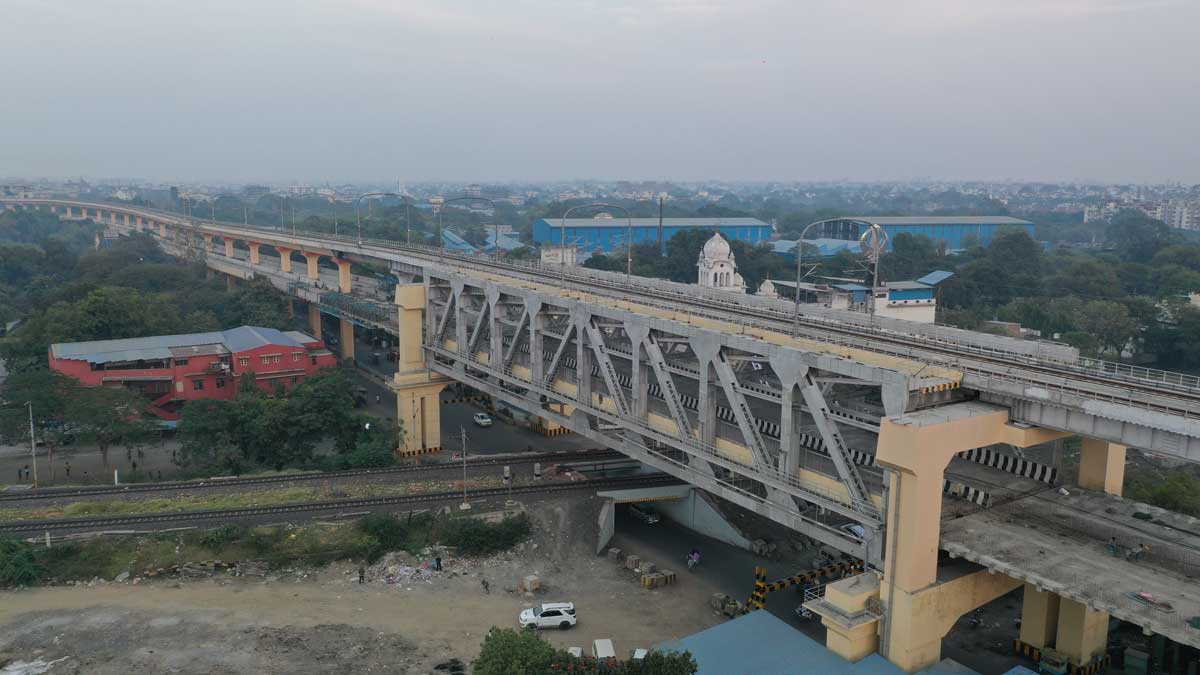

The phase 1 of Nagpur Metro comprises of a 39 km elevated corridor. Afcons Infrastructure delivered Reach 2 (North South corridor) and Reach 3 (East-West corridor) of the Nagpur Metro project phase I. It has constructed 17.1 km which is almost 44 per cent of the total viaduct length, and around 51 per cent of the overall civil works. Afcons constructed India’s first four-level transportation corridor at Gaddigodam Railway Crossing in Reach-2. This four-level transportation corridor is part of Asia’s longest double-decker (Metro-cum-NHAI) viaduct (5.3 km), which was thrown open to public on December 11, 2022, at the hands of honourable PM Narendra Modi.
Besides the longest double-decker viaduct, Afcons also constructed eight stations in Reach-2 and Reach-1, and two metro depots. To its credit the Sitabuldi interchange station by Afcons is the highest metro interchange station in India.
Afcons had to dig deep into its reserves. All forces collaborated to make this once-in-a-lifetime challenge a success. It enlisted expert support from its Chenab Railway Bridge project to critically review the preparedness. Manpower and machines were mobilised at an unprecedented pace. The tremendous support and cooperation from the client and others assisted Afcons to ensure a speedy completion of the project. Besides, for priority corridor of Reach-2, the team came up with smart solutions to ensure priority section was ready within three months.
At Sitabuldi, a 44 metre composite steel girder span had to be placed over the busy Govari flyover. After the drawings were approved in November 2018, fabrication of 230 tonne composite girders, including procurement, was achieved in a record time of 45 days. As Govari flyover could not be shut for a long time, it had to be really quick. Afcons deployed three cranes of 275 tonne, 220 tonne and 200 tonne capacity to erect the steel girders using the tandem lifting method. It took just four nights to erect four steel girders, followed by concreting.
Owing to the time constraints, temporary bearings were used for the steel girder erection. The entire deck was lifted with six span jacks and the temporary bearings were replaced with the permanent ones in a single day’s time.
Afcons opened four work fronts that enabled to squeeze the entire five months into two months period. The entire team was able to deliver their targets within time round the clock. Afcons used heavy duty cranes ranging from 500 tonne to 300 tonne. The infrastructure company used super lift 500 tonne crane which enabled to lift the components of the flyover. The biggest challenge was to erect the entire truss in a sequential manner. The truss was divided in three parts to expediate the erections. The major challenge was to erect entire truss with the accuracy of plus minus 5 mm. Afcons were able to complete entire erection with the accuracy of plus 3 mm. Its camber adjustment was more than the required theoretical dimensions.
The double-decker open web girder (OWG), which was created using 1,650 MT structural steel having 8,000 structural elements, was placed over the busy Gaddigodam railway crossing. All the activities were done in extremely tight railway block hours, given how busy this route is. The span stands at a height of 28 metre above the ground. Such a critical and complex task has never been attempted before in India. Apart from the 80 metre steel span, two adjacent composite girders with RCC deck slab, each of 25 metre span had to be completed.
Afcons also built a metro-cum-flyover, Asia’s longest double-decker viaduct (5.3 km) stretch over single piers. This was a unique exercise, as the design team conceptualised an in-house double decker launching girder. The fabrication of two such equipments was done within just three months. These double decker launching girders gave better productivity as compared to the conventional ones as the spans between two piers can be erected one after the other, after the completion of one auto-launching cycle. The engineering team saved 1.5 days for every span, which would not have been possible had it used the conventional launching girders.
The use of heavy-duty machineries, one super lift arrangement, 22 torque wrench machines, and special lowering arrangements for the erection of 80M double-decker steel span was unique. We also introduced unconventional erection methodologies such as eliminating of nosing structure altogether.
“Launching of this 18.9 metre wide steel girder across a live railway track at a height of 28 metre is a first for Indian Railways. We have also constructed the highest metro interchange station in India which is 32.32 metre high from the ground level while the Sitabuldi station was completed in just 20 months.”
- R Anantakumar, Director (Operations) & Urban Infra BU Head, Afcons Infrastructure Ltd.